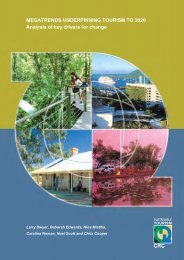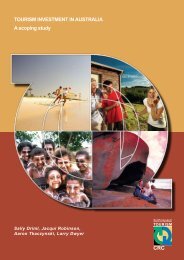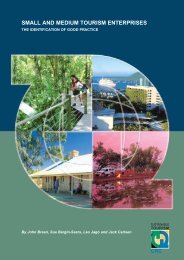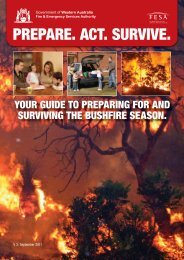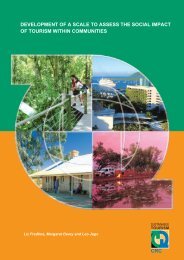Tourism Risk Management - Sustainable Tourism Online
Tourism Risk Management - Sustainable Tourism Online
Tourism Risk Management - Sustainable Tourism Online
Create successful ePaper yourself
Turn your PDF publications into a flip-book with our unique Google optimized e-Paper software.
CHAPTER 5: MEDIA AND COMMUNICATION<br />
Aim of This Chapter<br />
The aim of this chapter is to describe the role of the media and communication (including the role of<br />
Government Travel Advisories) in tourism crisis situations. It identifies the importance of the role of<br />
the media and as a conduit of information to the community and travellers. The chapter also<br />
establishes a systematic method of working with the media for destination managers.<br />
Introduction<br />
It has been estimated that a remarkable 25% of all news stories involve disasters or crises of some<br />
sort. Disasters attract the media in very large numbers, and it's not hard to see why. Disasters are<br />
spectacular, action-orientated, dramatic events which routinely feature human suffering and feats of<br />
endurance and bravery. From a media perspective they are relatively easy to cover, provide ample<br />
opportunity for dramatic photographs, and are guaranteed to attract an audience or sell newspapers.<br />
Disaster and crisis events inevitably prove an irresistible combination for the media, and for the<br />
general public who will be avid consumers of what the media produces.<br />
News will normally be reported as soon as it becomes available, and this is the case regardless of<br />
how inadequate the initial information is, or how uncertain the source. The advances in modern<br />
technology mean that news stories and pictures can be transmitted around the world within minutes.<br />
Even if the media isn't present in the initial stage of a disaster or crisis, members of the public will be,<br />
with mobile telephones and video cameras in hand, and their pictures will be accessed by the media<br />
and transmitted. Passengers in the London Underground rail system following the bombings in July<br />
2005, were transmitting pictures to the media from their wrecked carriages and as they evacuated<br />
through tunnels to safety.<br />
Media personnel usually have little understanding of the fact that in the confused aftermath of a<br />
disaster, information may be difficult or impossible to obtain. This can make them suspect that<br />
authorities are hiding information from them when the truth is that it just isn't available.<br />
Journalists are usually generalists, not specialists. This means that they are unlikely to have any<br />
depth of understanding of a disaster or crisis event, the cause, effects or the necessary response and<br />
recovery processes. They can, therefore, easily misunderstand what they see and hear.<br />
In the case of a tourism crisis, it is essential that local tourism operators only comment to the media<br />
on matters which are within the scope of their responsibilities and that they do not comment on<br />
operational matters which are the responsibility of emergency services or disaster management<br />
agencies.<br />
Patterns of Media Reporting<br />
There is a clear and predictable pattern of media reporting of disasters, so tourism operators and the<br />
industry will be able to predict the media focus and anticipate the information media representatives<br />
will be seeking:<br />
• In the initial stages, the media will report the extent and effects, concentrating on the facts of the<br />
situation.<br />
• The next focus (maybe one to two days later) is on the human interest side, in particular the<br />
heroes of the event and the hardships suffered by victims.<br />
72 <strong>Tourism</strong> <strong>Risk</strong> <strong>Management</strong> – An Authoritative Guide to Managing Crises in <strong>Tourism</strong>







